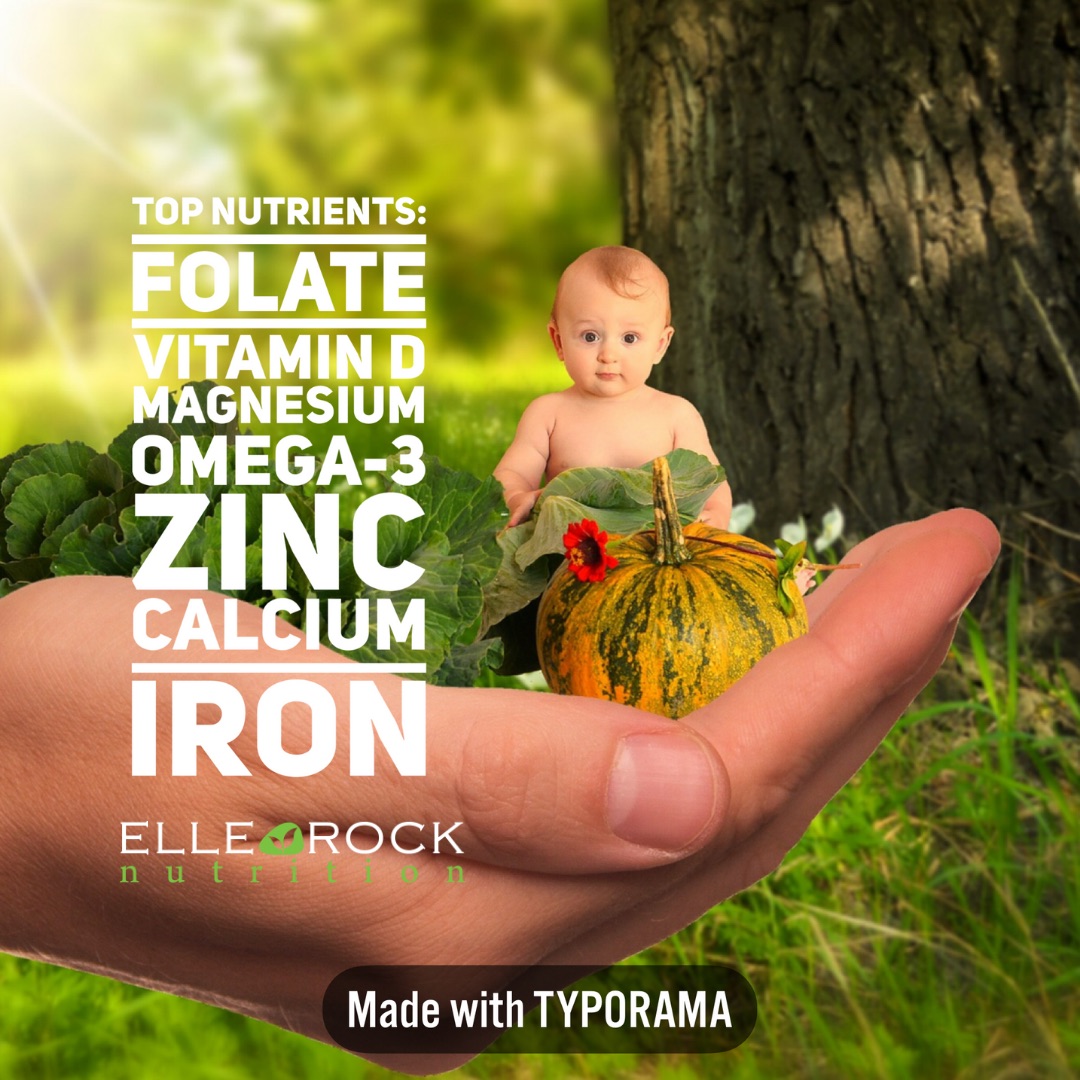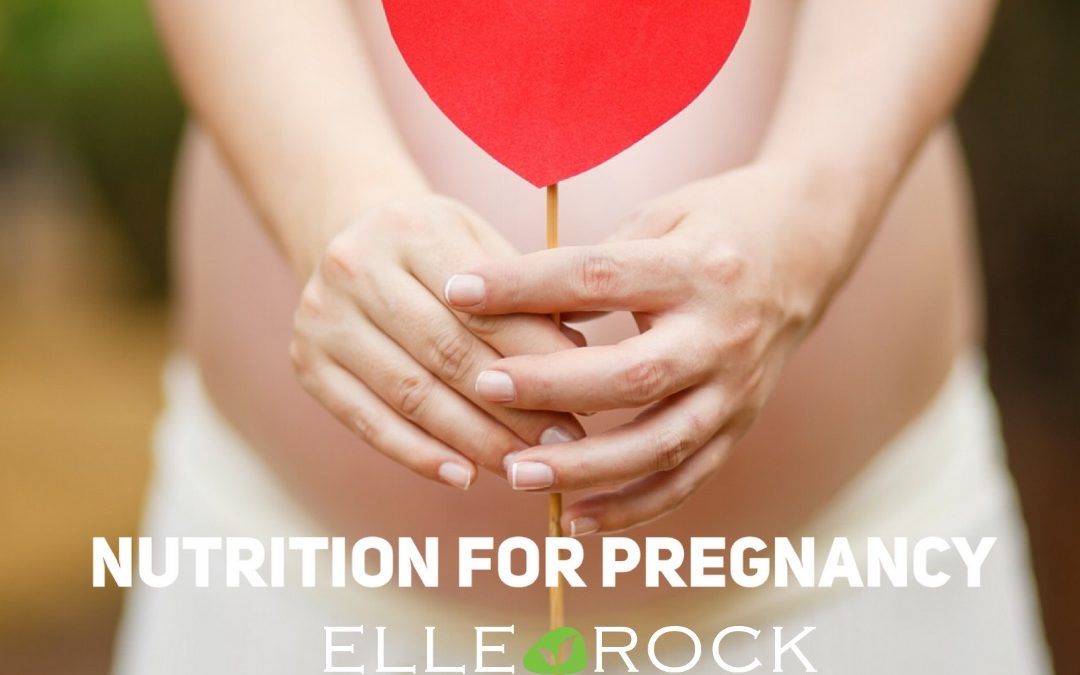TOP NUTRIENTS FOR A HEALTHY PREGNANCY
Nutrition during pregnancy
Read on if you are trying for a baby, pregnant, or have a family member or friend who is pregnant or are just intrigued…
Nutrients are substances that provide nourishment essential for the maintenance of life and for growth. Mothers transfer essential nutrients to their babies during pregnancy for healthy growth, which can sometimes leave mum at a deficit. Thus, it is important that the mother’s diet has an optimal nutrient intake for both her and her baby.
Here are some key nutrients required to maintain mother and baby’s health during pregnancy.
FOLATE
What is it?
Folate and folic acid are forms of the B9 vitamin.
Why is it needed?
Helps prevent birth defects in your baby’s brain and spinal cord, such as the condition Spina Bifida. Also, low folate levels are associated with recurrent spontaneous pregnancy loss.
Where do we get it from?
Folate naturally occurs in leafy vegetables such as spinach, broccoli, and lettuce, and okra, asparagus, fruits such as bananas, melons, and lemons, and legumes, animal protein, and orange juice, and tomato juice. Folic acid is the synthetic, but more absorbable, form used in vitamin supplements and fortified foods. The NHS recommends folic acid supplements during pre-conception and up to 12 weeks of pregnancy. Speak to your nutritional therapist and/or GP about possible supplementation. #WhoSaysSupplementsDontWork
VITAMIN D
What is it?
Vitamin D is a fat-soluble (dissolves in fats and oils) vitamin.
Why is it needed?
Deficiency of vitamin D in the mother can lead to rickets in the infant. Supplementation may reduce the risk of delivering a low birth weight infant and reduce the risk of developing gestational diabetes.
Where do we get it from?
Vitamin D is found in dietary sources, such as oily fish, eggs, and fortified milk. It is also made in our bodies when we are exposed to natural sunlight. The NHS also recommends vitamin D supplements during pregnancy.
MAGNESIUM
What is it?
Magnesium is an essential mineral.
Why is it needed?
Magnesium tends to be low in western diets. This mineral is imperative for pregnancy as it helps lower the risk of developing preeclampsia and eclampsia. The later is a condition where some pregnant women develop high blood pressure and experience convulsions. Magnesium supplementation may help reduce the incidence of pregnancy-related leg cramps.
Where do we get it from?
Magnesium is generally sourced from foods that are high in fibre such as, legumes (pulses), whole grains, fruits and vegetables (especially broccoli, squash, and green leafy vegetables), seeds, and nuts (especially almonds). Other sources include dairy products, meats and chocolate.

OMEGA-3 FATTY ACIDS
What is it?
Omega−3 fatty acids (FA) are a family of polyunsaturated FA; DHA and EPA are key types of omega-3s.
Why is it needed?
They are essential for the growth of the baby. DHA is very important for the development of your baby’s brain and eyes.
Where do we get it from?
ALA is found mainly in plant oils such as walnuts, chia seed and flaxseed oils. ALA can be converted into EPA and then to DHA, but the conversion is very limited. DHA and EPA are found in oily fish (salmon, sardines and mackerel) and other seafood. However, there is a concern out high mercury levels in oily fish. Thus, only a maximum of 2 portions per week of oily fish is recommended.
ZINC
What is it?
Zinc is an essential mineral.
Why is it needed?
Zinc is required for a functional immune system, behaviour and learning, thyroid hormone function and general health.
Where do we get it from?
Dietary sources of zinc include high protein foods such as meat, poultry, beans, seafood, dairy products, nuts, and fish.
CALCIUM
What is it?
Calcium is a mineral.
Why is it needed?
Supports the growth and development of your baby’s bones and helps to maintain your bones also.
Where do we get it from?
Dairy foods, calcium-fortified dairy-free alternatives, oily fish, some dark leafy green vegetables (such as kale, rocket, pak choi and watercress), mineral water, some nuts and seeds – including almonds, Brazil nuts, hazelnuts and sesame seeds.
IRON
What is it?
Iron is a trace mineral.
Why is it needed?
To ensure your baby has a sufficient blood supply and receives necessary oxygen and nutrients.
Where do we get it from?
Animal sources of iron contain heme-iron, which is very absorbable. Examples of these include all meats, poultry, fish, and eggs.
Plant sources of iron contain non-heme iron, which is not as bioavailable. Examples of these include pulses, nuts, and green leafy vegetables such as watercress, wholemeal bread, and dried fruit.
Don’t panic vegetarians and vegans, nature (God) has a way of working things out as non-heme iron is better absorbed with vitamin C rich foods such as citrus fruits and bell peppers.
All things considered, moderation is key. Do not overeat the same types of food. Remember to stay hydrated. Thoroughly wash all fruit and vegetables before consumption. Click here to find out which foods to take care with, reduce or cut out in pregnancy. This article is by no means exhaustive of the nutrients required for pregnancy but should be a good support towards a healthy pregnancy. Best wishes and Happy Mothers Day!
SUBSCRIBE!
Do you want to hear from me directly? Get the latest ELLE ROCK NUTRITION updates, services, promotions, offers and events! Click here to join the mailing list.
ELLE ROCK NUTRITION
©Rochelle Logan-Rodgers BSc(Hons), PgDip – BANT & CNHC Registered Nutritional Therapist
© Rochelle Logan-Rodgers and ELLE ROCK NUTRITION, 2019. Unauthorised use and/or duplication of this material without express and written permission from this site’s author and/or owner is strictly prohibited. Excerpts and links may be used, provided that full and clear credit is given to Rochelle Logan-Rodgers and ELLE ROCK NUTRITION with appropriate and specific direction to the original content.
DISCLAIMER:
The articles, posts and other content on this website or any other social media platform does not provide medical advice, professional diagnosis or treatment. Suggestions provided will be for general information and educational purposes only. It should not be treated as a substitute for the medical advice or the professional care of your own doctor or any other qualified healthcare professional. Consult a qualified health professional regarding health conditions or concerns, and before starting a new diet, supplementation or a health program.
BIBLIOGRAPHY
British Nutrition Foundation (2019). Nutrition during pregnancy – British Nutrition Foundation – Page #1. [online] Nutrition.org.uk. Available at: https://www.nutrition.org.uk/healthyliving/nutritionforpregnancy/nutrition-and-supplements-during-pregnancy.html?start=2 [Accessed 30 Mar. 2019].
Naturalmedicines.therapeuticresearch.com. (2019). Natural Medicines – Folic Acid. [online] Available at: https://naturalmedicines.therapeuticresearch.com/databases/food,-herbs-supplements/professional.aspx?productid=1017 [Accessed 01 Mar. 2019].
Naturalmedicines.therapeuticresearch.com. (2019). Natural Medicines – Login. [online] Available at: https://naturalmedicines.therapeuticresearch.com/databases/health-wellness/professional.aspx?productid=1547 [Accessed 30 Mar. 2019].
Nhs.uk. (2019). Pregnancy supplements ‘don’t help, just take vit D and folic acid’. [online] Available at: https://www.nhs.uk/news/pregnancy-and-child/pregnancy-supplements-dont-help-just-take-vit-d-and-folic-acid/#conclusion [Accessed 30 Mar. 2019].

